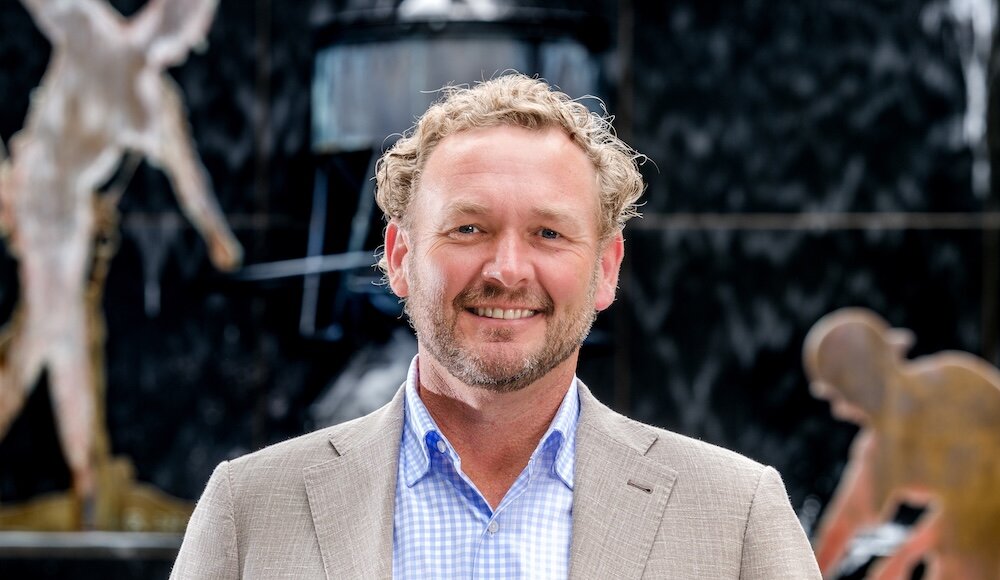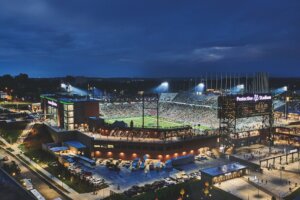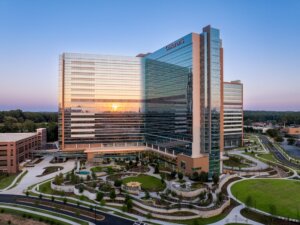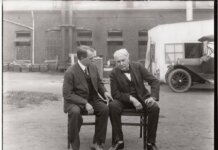
One of Rob Blalock’s first construction projects was an elaborate treehouse he and several of his childhood friends built in the woods near their homes in Chattanooga. The structure quickly had to be dismantled, however, once it was discovered it actually had been built on a neighbor’s land.
“We didn’t understand property lines back then,” Blalock says with a smile.
Blalock has learned plenty about nearly every aspect of the construction business since then, especially after spending the past 27 years working for Birmingham-based Brasfield & Gorrie.
In fact, Blalock has progressed in the business so much that at the beginning of this year he took over as Brasfield & Gorrie’s CEO.
This would be an impressive accomplishment regardless of the situation. But what makes Blalock’s elevation into the CEO role particularly noteworthy is that he’s not named Gorrie. Meaning that for the first time since Miller Gorrie purchased the assets of Thomas Brasfield to form Brasfield & Gorrie in 1964, there is a different last name atop the company’s C-Suite.

“I could not be more confident in the future outlook for our company,” outgoing CEO Jim Gorrie, son of Miller Gorrie, said in a statement announcing the change. “Rob’s creativity, passion and leadership have been evident throughout his career.”
What wasn’t evident, at least to Blalock himself, was his eventual landing spot on the upper rungs of the corporate ladder. Blalock originally wasn’t even sure he was interested in a construction career, having changed his college major three times — including a stint in pre-med — before finally graduating from Auburn University with a degree in architectural and building sciences. Soon afterward he took an entry-level position at Brasfield & Gorrie.
“I really didn’t know much about the company,” Blalock says. “I stumbled in here as a complete random hire.”
Blalock quickly discovered that he enjoyed both the job and the company. He says his goal at the time was to work on downtown high-rises, and he began doing so out of the Brasfield & Gorrie offices in Atlanta, helping add to the city’s sprawling skyline with the construction of various office buildings, hotels and condominiums.
“From the very beginning, I loved the job,” Blalock says. “I loved working with the clients and helping figure out their challenges, then bringing it all together with a design and a budget that fit them. … After a few years I started getting some offers (from other companies), but it got to the point where I was like, ‘I love it here. There’s no way I could leave.’”
Early in his career, Blalock began working on several projects with Atlanta-based architect Daniel Joy, who went on to become one of the founders of the Rule Joy Trammell + Rubio design firm. Even though Blalock was still in his 20s at the time, Joy says his leadership capability already was evident.

“Whatever the circumstance or situation, leaders step in and solve things, and that’s always been one of Rob’s strengths,” Joy says. “He has the ability to command respect just in the way he presents himself. It’s an innate characteristic that he has, which is a sign of a great leader. It doesn’t surprise me that he’s worked his way up to where he is at Brasfield & Gorrie.”
Blalock says one of the highlights for him along the way was the development of the 1075 Peachtree building, a 38-story multi-use complex in midtown Atlanta. It was one of the first major projects he led as a division manager, and he did so with a young but enthusiastic team.
“It was a tough job, but those young guys just knocked it out of the park,” Blalock says. “That job was very rewarding. Projects like that are what I love most about this business, that we can produce something that you can see and walk into and work in. What used to be an empty lot is now a building that people are using every day.”
Blalock was enjoying his time as Atlanta division manager so much that he says he was content to remain in that role while he and his wife raised their four children. Then one day in 2018, Blalock received a call on his cell phone from Jim Gorrie. On a Saturday afternoon.
“I thought, uh oh, that’s unusual,” Blalock says. “Turns out he called to say he was thinking that I might be the guy to replace him (as company CEO) one day. But to do so, I would need to move to Birmingham so I could work there for several years.
“That was like an asteroid hitting me in the head. I had never even contemplated that idea.”
It did not take long for Blalock and his wife to decide that the opportunity was too good to pass up. So, the family relocated to Birmingham, and Blalock embarked on what basically was a six-year transition period into the CEO role.
“That was a great way to do it, because it wasn’t like all this was thrust on me all of the sudden,” Blalock says. “Over time I was given a little more and a little more responsibility. It happened gradually to where this year was a very easy transition.”

While the transition apparently has not hampered Brasfield & Gorrie’s growth – the company expects to top $7 billion in revenue this year, an 11% increase from 2024 – Blalock says the company “hasn’t fully been on offense.” He expects that to change in the coming years.
“It’s time for us to start throwing the ball down the field a little more,” Blalock says. “We’re not really looking to expand geographically outside the Southeast, but we want to expand our major market sectors — health care, commercial, industrial, mission critical, heavy civil and federal — extensively within that geography. That will be the strategy for the next three or four years, then we’ll probably get back to geographic expansion.”
Whatever the future footprint might look like for Brasfield & Gorrie, Blalock says one thing that will not change is the company’s commitment to its hometown and state. Even as the firm works on major projects outside Alabama involving data centers, health care facilities and water infrastructure, the company continues to take small local jobs that cost as little as $1,000.
“We’re doing local church renovations, the Airbus assembly plant in Mobile and everything in between,” Blalock says. “We like to keep a foot in both worlds. It’s worked for the first 61 years, and we’re going to continue with that strategy.”
Cary Estes and Art Meripol are Birmingham-based freelance contributors to Business Alabama.
This article appears in the September 2025 issue of Business Alabama.



